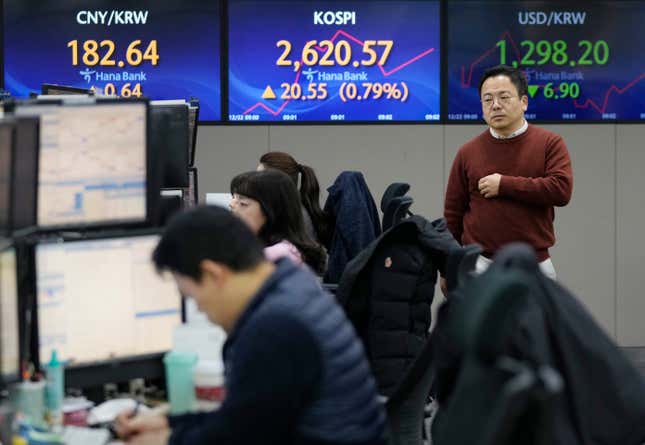
BANGKOK (AP) — Shares were mostly higher in Asia on Friday after several strong profit reports helped Wall Street claw back most of its sharp loss from day before.
Benchmarks fell in Hong Kong and Bangkok but rose elsewhere in the region. U.S. futures fell while oil prices advanced.
Japan's core inflation rate fell to 2.5% in November from 2.9% a month earlier as energy costs eased. The decline, if it augurs further weakening of prices, might counter expectations that the central bank will tighten its lax monetary policy in coming months.
Bank of Japan officials have indicated they want to ensure inflation is sustained near the 2% target level and that wages are also rising before adjusting the central bank's longstanding minus 0.1% benchmark interest rate.
“Nonetheless, it would be wrong to conclude that inflationary pressures are now firmly on the decline,” Marcel Thieliant of Capital Economics said in a commentary. With global inflation waning, “weakening in underlying inflation largely reflects the pass-through of falling import costs which is weighing on price rises of processed food products and other industrial products,” it said.
Tokyo's Nikkei 225 index edged 0.2% higher to 33,193.50 and the Kospi in Seoul added 0.4% to 2,609.54.
Hong Kong's Hang Seng index gave up 0.4% to 16,548.98 and the Shanghai Composite index was up 0.5% at 2,933.25. In Sydney, the S&P/ASX 200 picked up 0.1% to 7,510.90.
Bangkok's SET slipped 0.3% and the Sensex in Mumbai was up 0.3%.
On Thursday, the S&P 500 climbed 1% to 4,746.75. It is within 1% of its all-time high after suffering its worst tumble in nearly three months. The Dow Jones Industrial Average advanced 0.9% to 37,404.35, nearing yet another record. The Nasdaq jumped 1.3% to 14,963.87.
Micron Technology leaped 8.6% for one of the market's biggest gains after reporting stronger results for the latest quarter than analysts expected and saying it sees business conditions improving throughout its fiscal year.
CarMax rose 5.2% after it beat profit expectations despite what it called “persistent widespread pressures in the used car industry.” And cruise operator Carnival steamed 6.2% higher after reporting better quarterly results than expected.
The trio helped lead a widespread rally where more than 90% of the stocks within the S&P 500 climbed.
Reports on Thursday painted a mixed picture of whether the Federal Reserve can pull off its long-odds tightrope walk of bringing about a slowdown in the economy powerful enough to conquer high inflation but not so strong that it causes a recession.
One report showed that slightly more U.S. workers applied for unemployment benefits last week, but the number was still below expectations and low relative to history.
Another report showed manufacturing in the mid-Atlantic region is weakening by more than expected. Manufacturing has been one of the hardest-hit areas of the economy. And a third report said the U.S. economy’s growth during the summer wasn’t quite as powerful as earlier estimated.
Investors are ebullient about potential rate cuts and a resilient economy in 2024. Both would help buoy stock prices. The S&P 500 has charged 15% higher in roughly two months on anticipation for those twin supports, and the index is on track for an eighth straight week of gains.
That's despite Fed officials having penciled in far fewer rate cuts for 2024 than Wall Street. Critics say the number of rate cuts traders are expecting is unlikely unless the economy falls into a recession, which some still see as an inevitable consequence of all the rate hikes already instituted by the Federal Reserve.
That's raised criticism that stocks have gone too far, too fast and become too expensive relative to profits that companies are earning. Even before Wednesday's 1.5% drop for the S&P 500, several strategists on Wall Street were forecasting at least a pause in the rally in the short term.
In other trading Friday, U.S. benchmark crude oil added 60 cents to $74.49 per barrel in electronic trading on the New York Mercantile Exchange. It gave up 33 cents to $73.89 on Thursday.
Brent crude, the international standard, advanced 52 cents to $79.68 per barrel.
The U.S. dollar rose to 142.45 Japanese yen from 142.12 yen. The euro slipped to $1.1002 from $1.1012.
___
AP Business Writer Stan Choe contributed.